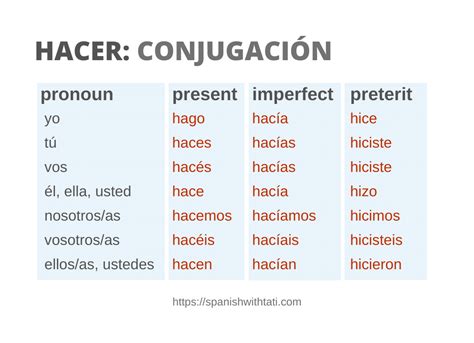The preterite form of verbs in Spanish is a vital aspect of the language, and mastering it can significantly improve your communication skills. One of the most commonly used verbs in Spanish is "hacer," which means "to do" or "to make." In this article, we will delve into the preterite form of "hacer" and provide you with practical examples, conjugation charts, and tips to help you become proficient in using this verb.
Understanding the Preterite Tense
Before we dive into the specifics of the preterite form of "hacer," it's essential to understand the concept of the preterite tense in Spanish. The preterite tense is used to describe completed actions in the past. It's often translated to English as the simple past tense, but it has a more nuanced meaning in Spanish. The preterite tense is used to describe actions that started and finished in the past, whereas the imperfect tense is used to describe ongoing or repeated actions in the past.
Conjugation of Hacer in the Preterite Tense
The conjugation of "hacer" in the preterite tense is relatively straightforward. Here is the conjugation chart:
| Subject | Preterite Form |
|---|---|
| Yo (I) | hice |
| Tú (you) | hiciste |
| Él/ella/usted (he/she/you formal) | hizo |
| Nosotros/as (we) | hicimos |
| Vosotros/as (you plural) | hicisteis |
| Ellos/as (they) | hicieron |

Examples of Hacer in the Preterite Tense
Here are some examples of "hacer" in the preterite tense:
- Yo hice mi tarea anoche. (I did my homework last night.)
- Tú hiciste un gran trabajo en el proyecto. (You did a great job on the project.)
- Él hizo una gran cantidad de dinero en la empresa. (He made a lot of money in the company.)
- Nosotros hicimos un viaje a España el año pasado. (We took a trip to Spain last year.)
- Vosotros hicisteis una gran fiesta ayer noche. (You guys had a great party last night.)
When to Use the Preterite Form of Hacer
The preterite form of "hacer" is used to describe completed actions in the past. Here are some scenarios where you would use the preterite form:
- To describe a completed action: Yo hice mi tarea anoche. (I did my homework last night.)
- To describe a specific point in time: Hice un viaje a España el año pasado. (I took a trip to Spain last year.)
- To describe a change or a new situation: Hicimos un nuevo amigo en la fiesta. (We made a new friend at the party.)
Common Expressions with Hacer in the Preterite Tense
Here are some common expressions that use the preterite form of "hacer":
- Hacer una pregunta (to ask a question)
- Hacer un viaje (to take a trip)
- Hacer un trabajo (to do a job)
- Hacer una llamada (to make a call)

Tips for Mastering the Preterite Form of Hacer
Here are some tips to help you master the preterite form of "hacer":
- Practice, practice, practice: The key to mastering any verb conjugation is to practice, practice, practice. Try to use the preterite form of "hacer" in different contexts and scenarios.
- Focus on the verb ending: The verb ending is the most important part of the conjugation. Focus on the verb ending to help you remember the correct conjugation.
- Use flashcards: Flashcards can be a great tool to help you memorize the conjugation of "hacer" in the preterite tense.
- Listen to native speakers: Listen to native speakers to get a sense of how the preterite form of "hacer" is used in context.
Conclusion
Mastering the preterite form of "hacer" is a crucial part of becoming proficient in Spanish. With practice and dedication, you can become comfortable using the preterite form of "hacer" in different contexts and scenarios. Remember to focus on the verb ending, use flashcards, and listen to native speakers to help you improve your skills.
Additional Resources
If you want to improve your skills further, here are some additional resources:
- Online quizzes and exercises: There are many online resources that offer quizzes and exercises to help you practice the preterite form of "hacer."
- Language exchange websites: Language exchange websites can connect you with native speakers who can help you practice your skills.
- Spanish language courses: Consider taking a Spanish language course to get personalized instruction and feedback.
Share Your Thoughts
We hope this article has helped you master the preterite form of "hacer" in Spanish. Share your thoughts and experiences in the comments below. How do you practice the preterite form of "hacer"? What tips do you have for others who are trying to master this verb conjugation?
What is the preterite tense in Spanish?
+The preterite tense in Spanish is used to describe completed actions in the past. It's often translated to English as the simple past tense, but it has a more nuanced meaning in Spanish.
How do I conjugate "hacer" in the preterite tense?
+The conjugation of "hacer" in the preterite tense is relatively straightforward. The conjugation chart is: yo hice, tú hiciste, él/ella/usted hizo, nosotros/as hicimos, vosotros/as hicisteis, ellos/as hicieron.
What are some common expressions that use the preterite form of "hacer"?
+Some common expressions that use the preterite form of "hacer" include: hacer una pregunta (to ask a question), hacer un viaje (to take a trip), hacer un trabajo (to do a job), hacer una llamada (to make a call).
